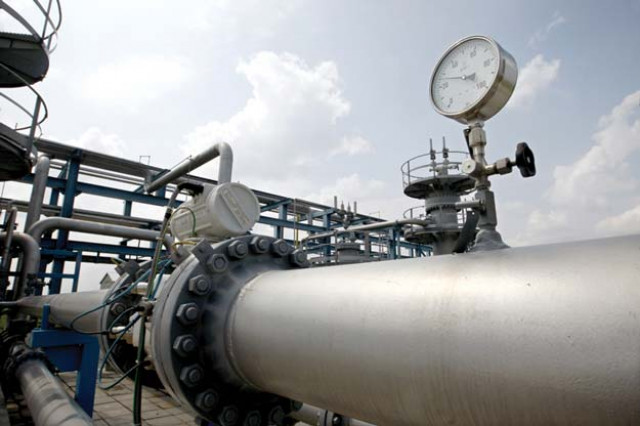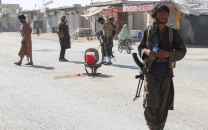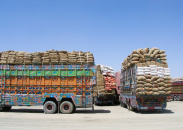Raising gas prices: Amidst walkouts and harsh rhetoric, Senate passes GIDC bill
New law likely to erase legal challenges to the tax, improve financial stability of state-owned gas companies

The bill will not only authorise the government to continue collecting the GIDC, but will also provide retroactive legalisation to the GIDC the government has been collecting since 2011. PHOTO: REUTERS
The government had originally imposed the GIDC in December 2011 as a means of increasing the prices paid by consumers – both retail and industrial – for natural gas. As Pakistan’s largest natural gas fields near depletion, newer fields tend to be smaller, and thus cost more to extract the gas.
In addition, as domestic production of gas declines, the country will have to import natural gas, which tends to be significantly more expensive than domestically produced gas. According to an analysis by the Petroleum Ministry, Pakistan’s domestic gas production peaked in 2014 at 4,400 million cubic feet per day (mmcfd), while demand already exceeds 6,000 mmcfd and is projected to rise to 8,000 mmcfd by 2022.
Pakistan imported its first shipment of liquefied natural gas at a price close to $7 per million British thermal units (mmbtu), whereas no domestic consumer pays more than $4 per mmbtu. As imported gas forms an increasingly larger share of the natural gas consumed in Pakistan, the price will inevitably need to go up, a realisation that had originally prompted the Zardari Administration to levy the cess.
The GIDC, however, was challenged in the Supreme Court, which ruled in August 2014 that the government did not have the right to levy what was essentially a new tax without authorisation from the National Assembly. That authorisation came earlier this week when the 2015 GIDC Bill passed the National Assembly and was sent to the Senate for final approval. The final approval was granted on Wednesday and, after President Mamnoon Hussain signs the bill, it will become law.
The bill will not only authorise the government to continue collecting the GIDC, but will also provide retroactive legalisation to the GIDC the government has been collecting since 2011. That should provide some semblance of financial stability to the state-owned natural gas utilities – Sui Northern Gas Pipelines and Sui Southern Gas Company. Neither of the two has issued financial statements since March 2013, largely due to the uncertainty that surrounds their revenue collection.
The stock market had a somewhat negative reaction to the news of the bill passing, with some fertiliser company stocks closing down sharply. Fatima Fertilizers in particular was down the maximum 5% allowed for each trading day on the Karachi Stock Exchange. “While the impact of this [GIDC bill] approval is limited to a few listed names, confusion over its application and [any potential] hit on earnings particularly on fertiliser makers increased investor anxiety,” said Faisal Bilwani, a research analyst at Elixir Securities, an investment bank, in a note issued to clients on Wednesday.
None of these considerations, however, were part of the long and contentious debate over the bill in the Senate on Wednesday, which was marked by politicians from opposition parties using harsh anti-Punjab rhetoric and politicians from the Muttahida Qaumi Movement (MQM), the Pakistan Tehrik-e-Insaf (PTI) and the Awami National Party (ANP) all walking out at various stages of the debate.
Several Senators from Khyber-Pakhtunkhwa, Sindh and Balochistan contended that while they produced most of Pakistan’s natural gas, they claimed it was mostly consumed in Punjab. Balochistan Senator Usman Kakar from the Pakhtunkhwa Milli Awami Party (PkMAP) said that 90% of Balochistan’s production of natural gas was used up by other provinces while 26 of its 32 districts did not have any natural gas supply.
Senator Mir Hasil Khan Bizenjo, also from Balochistan, from the National Party said “I think this is time to address the grievances of smaller provinces,” as he demanded the government make a commitment to provide gas to at least all district headquarters of Balochistan, a call in which he was joined by PkMAP’s Kakar.
“I live in Punjab but there is no gas supply for my own home,” said Petroleum Minister Shahid Khaqan Abbasi, in a bid to pacify his parliamentary colleagues and to convince the members to vote for the bill which he said was not a province-specific bill, but for the development of infrastructure all across the country.
Earlier, Senator Shahi Syed from ANP led a walkout against the bill saying he “was against the atrocities of Punjab.” Senator Mohsin Aziz from the PTI said that the gas was being imported to meet the needs of Punjab as other three provinces had surplus production of natural gas.
“This bill would cause destruction of Punjab,” said Sardar Azam from PkMAP.
Despite such harsh rhetoric hurled his way, the petroleum minister responded by committing the federal government to ensuring that every district headquarters would be supplied with natural gas by the end of the Nawaz Administration’s current tenure in 2018. He also said that the cess was not new and had been collected in the past to be used to raise revenue for transnational gas projects and related development. “Smaller provinces would be the priority for the supply of imported gas,” he announced.
Unlike the National Assembly, where the bill passed relatively smoothly due to the support of the Pakistan Peoples Party (PPP), in the Senate, the government was forced to offer to set up a special committee that would monitor the implementation of the GIDC. The committee would give recommendations on the bill’s implementation, which would be binding on the government, in six weeks.
Abbasi announced that the GIDC would not be collected until the special committee completes its task. He added that only those companies whose balance sheet shows that they have collected the cess from consumers would be asked to for submission by the government.
During the debate, leader of the opposition in the Senate Aitzaz Ahsan asked the government “to come out clean and don’t let Punjab become a target [of criticism and allegations],” as a large number of opposition members had alleged that the cess was being collected for Punjab. He pointed out that main portfolios of the federal cabinet were being occupied by the lawmakers from Punjab and added “it seems that this is a Punjab-based government.”
He advised the government to take seriously the concerns of senators from smaller provinces, who had termed the bill as a ‘conspiracy to weaken the federation’. “I am not hurt by the speeches [being from Punjab] but by the attitude of the government and have fear that they might not learn lessons from past,” he said.
Ahsan also said that he was supporting the bill because the last government of his party had introduced it in 2011 therefore was in no position to oppose it.



















COMMENTS
Comments are moderated and generally will be posted if they are on-topic and not abusive.
For more information, please see our Comments FAQ